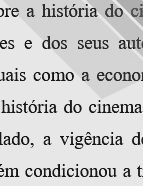

................................
In the late 1980s, another indispensable tool for the study of Portuguese cinema emerged: the Dicionário do Cinema Português [Dictionary of Portuguese Cinema], written by Jorge Leitão Ramos and published by Caminho, in three volumes covering the period 1895-2003. The publication of the first volume, in 1989, marks the end of a second period in the historiographical production of Portuguese cinema. In little over a decade (1977-89), writing had shifted from a generally memorialistic register, with some historiographical pretensions, to an awareness of the need for interdisciplinary scientific and methodological bases. Despite the importance of continuing to inventory the information, a task timely initiated and proficiently undertaken by the Cinemateca Portuguesa, some interested parties alerted to the urgency of embarking on a critical treatment of the data available and to be made available.
The first academic studies on cinema began to emerge in Portugal in the 1990s. During this period, film studies were introduced in some Portuguese faculties (Faculdade de Letras da Universidade de Coimbra [Faculty of Arts of the University of Coimbra], Departamento de Ciências da Comunicação da Faculdade de Ciências Sociais e Humanas da Universidade Nova de Lisboa [Department of Communication Sciences, Faculty of Social Sciences and Humanities, New University of Lisbon]) and research centres (Centro de Estudos Interdisciplinares do Séc. XX da Universidade de Coimbra [Centre for Interdisciplinary Studies on the 20th Century, University of Coimbra]), which significantly changed the state of the art. Several master's dissertations and doctoral theses on cinema were produced, but it was the launch of the book O Cinema sob o Olhar de Salazar [Cinema under Salazar's eye] (Círculo de Leitores, re-edited in 2011), coordinated by Luís Reis Torgal in 2001, which symbolically marked the passing of the torch to the academy of film studies in Portugal. It brought together unpublished texts by a series of authors who, in previous years, had presented academic works initiating the problematisation of the history of Portuguese cinema which had, in the meantime, been canonised by the publications of former decades.
